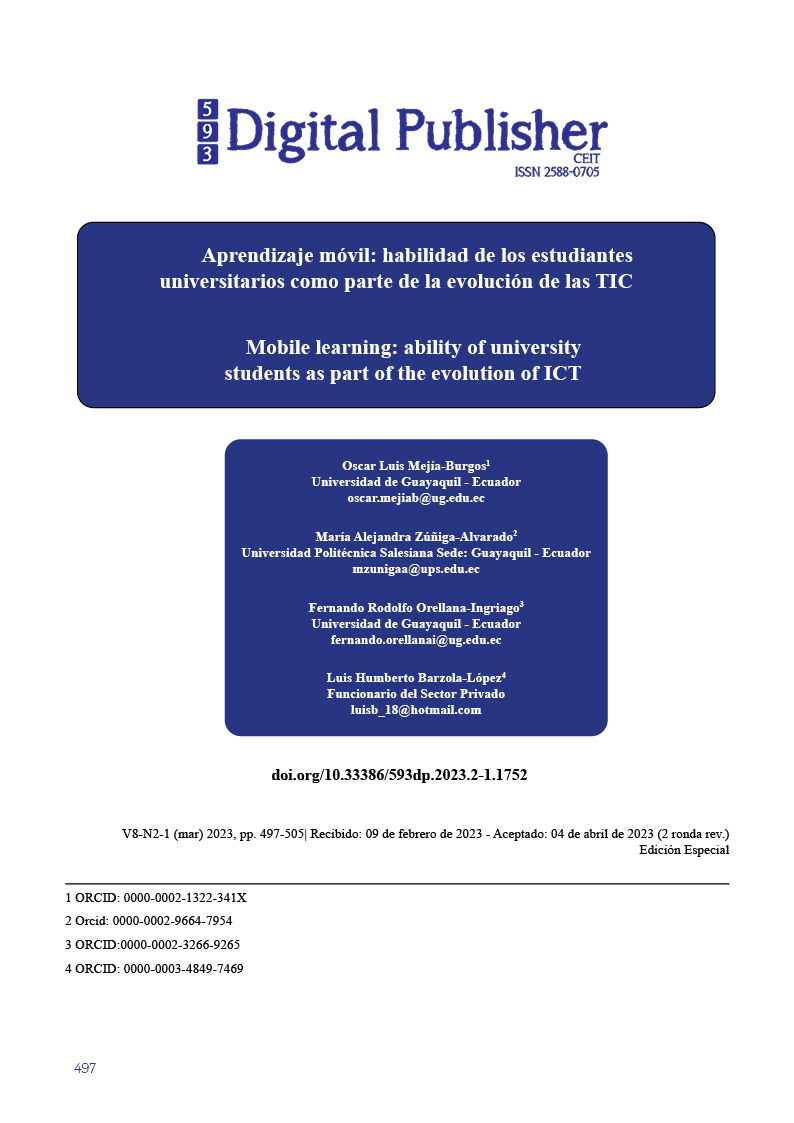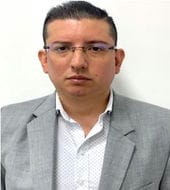Mobile learning: ability of university students as part of the evolution of ICT
Main Article Content
Abstract
The objective of this research was based on analyzing mobile learning as a skill of university students as part of the evolution of ICT, through a quantitative methodology supported by bibliographic and documentary research, the sample consisted of 60 students from the second semester of the career of Authorized Public Accounting. Obtaining as results that the students materializing the principle of "learning to learn" focus on their autonomy and through the use of virtual platforms the student pays due attention to the activities carried out to achieve feedback, likewise, the students when being able to use the internet to support their studies, they try to look for tutorials on the management of these platforms and not stay only with what is explained in their induction courses that the university generally offers, thus allowing them to recognize the platform menus and locate themselves in time and space within it. In conclusion, it is mentioned that higher education students have acquired knowledge and mobile skills over time that have made them direct participants in the evolution of ICTs, achieving relevant aspects in their educational training, in the same way universities during and after COVID-19 they have managed to make great progress in terms of the implementation of platforms that are here to stay, especially in those traditional universities that did not have these resources, since it is necessary to recognize that today's youth manage different teams technologies that they use to support their professional training.
Downloads
Article Details

This work is licensed under a Creative Commons Attribution-NonCommercial-ShareAlike 4.0 International License.
1. Derechos de autor
Las obras que se publican en 593 Digital Publisher CEIT están sujetas a los siguientes términos:
1.1. 593 Digital Publisher CEIT, conserva los derechos patrimoniales (copyright) de las obras publicadas, favorece y permite la reutilización de las mismas bajo la licencia Licencia Creative Commons 4.0 de Reconocimiento-NoComercial-CompartirIgual 4.0, por lo cual se pueden copiar, usar, difundir, transmitir y exponer públicamente, siempre que:
1.1.a. Se cite la autoría y fuente original de su publicación (revista, editorial, URL).
1.1.b. No se usen para fines comerciales u onerosos.
1.1.c. Se mencione la existencia y especificaciones de esta licencia de uso.
References
Avitia, P., & Uriarte, I. (2017). Evaluación de la habilidad digital de los estudiantes universitarios: estado de ingreso y potencial educativo. Revista Electrónica de Tecnología Educativa(61), 1-13. Obtenido de https://hdl.handle.net/11162/207286
Basantes, A., Naranjo, M., Gallegos, M., & Benítez, N. (2017). Los dispositivos móviles en el proceso de aprendizaje de la facultad de educación ciencia y tecnología de la Universidad Técnica del Norte de Ecuador. Formación Universitaria, 10(2). doi:http://dx.doi.org/10.4067/S0718-50062017000200009
Boude, O., & Sarmiento, J. (2017). El reto de formar a profesores universitarios para integrar el aprendizaje móvil. Educación Médica Superior, 31(1). Obtenido de http://scielo.sld.cu/scielo.php?pid=S0864-21412017000100007&script=sci_arttext&tlng=pt
Carreras, G., Gamallo, F., & Díaz, R. (2018). El aprendizaje móvil como herramienta de trabajo en la enseñanza de inglés en la universidad Medica. Revista Habanera de Ciencias Médicas, 17(6). Obtenido de http://www.revhabanera.sld.cu/index.php/rhab/article/view/2490
Fernandez-Vega, I., Santos-Juanes, J., & Quirós, L. (2021). Usoi de la app Kahoot para cuantificar el grado de atención del alumno en la asignatura de Anatomía Patológica en Medicina y evaluación de la experiencia. Educación Médica, 22(5), 375-379. doi:https://doi.org/10.1016/j.edumed.2020.01.004
Figueroa, M. G., & Ramírez, M. (2018). M-Learning y desarrollo de habilidades digitales en educación superior a distancia. Revista Ensayos Pedagógicos, XIII(2), 97-118. Obtenido de https://www.revistas.una.ac.cr/index.php/ensayospedagogicos/article/view/11327/14487
Fuentes, L. (2017). Beneficios de usar plataformas que sirven como apoyo a la educación presencial en la educación superior en el estado de México. Memorias del Encuentro Internacional de Educación a Distancia, 5(5). Obtenido de http://www.udgvirtual.udg.mx/remeied
Gallardo, J., & Iñiguez, P. (2016). Desarrollo de un recurso didáctico para reforzar destrezas matemáticas en niños usando aplicativo móvil y reconocimiento de voz. Guayaquil: Escuela Superior Politécnica del Litoral. Obtenido de http://www.dspace.espol.edu.ec/handle/123456789/37197
Garay, J. (2020). Aplicaciones de dispositivos móviles como estrategia de aprendizaje en estudiantes universitarios de enfermería. Una mirada desde la fenomenología crítica. Ride. Revista Iberoamericana para la investigación y el desarrollo educativo, 10(20), 1-18. doi:https://doi.org/10.23913/ride.v10i20.594
Garcés, H. (2000). Investigación científica. Quito, Ecuador: Ediciones Abya-Yala. Obtenido de https://digitalrepository.unm.edu/cgi/viewcontent.cgi?article=1356&context=abya_yala
Hernández, R., Fernández, C., & Baptista, P. (2014). Metodología de la Investigación. Mexico: McGraw Hill.
Lagos, G., Mora, K., Mejía, D., Peláez, R., & Peláez, J. (2018). M-Learning, un cambio hacia aprendizaje ybicuo en la educación superior del Ecuador. Revista Ibérica de Sistemas e Tecnologias de Informação(18), 47-59. Obtenido de http://www.filosofia.ug.edu.ec/wp-content/uploads/docs/El%20m-learning%20Gladis%20Lagos%20Reinoso.pdf
Manzaneda, M., & Valero, V. (2022). Matlab en el aprendizaje de la cinemática en estudiantes de Ingeniería Civil. Horizonte de la Ciencia, 12(22), 132-142. Obtenido de https://167.114.2.69/index.php/horizontedelaciencia/article/view/1070
Muñoz, F., Matus, O., Pérez, C., & Fasce, E. (2020). Blended learning y predisposición al aprendizaje autodirigido en un programa de especialización dental. Educación Médica, 21(4), 230-236. doi:https://doi.org/10.1016/j.edumed.2018.08.006
Palella, S., & Martins, F. (2010). Metodología de la investigación cuantitativa. Caracas: FEDUPEL, Fondo Editorial de la Universidad Pedagógica Experimental Libertador.
Pari, J., & Tapara, R. (2017). Implementación de la plataforma virtual Moodle 3.2 para mejorar el proceso de enseñanza aprendizaje online en el modelo educativo por competencias en los estudiantes del Instituto de Educación Superior Tecnológico La Recolecta de la ciudad de Arequipa. Universidad Nacional San Agustín de Arequipa. Obtenido de http://repositorio.unsa.edu.pe/handle/UNSA/5090
Pineda, J. (2022). Apropiación social de las Tic por adolescentes. Caso Unidad Educativa Colegio San Vicente de Paúl, en Barquisimeto, Estado Lara. Universidad Yacambú.
Rivero, C., Soria, E., & Turpo, O. (2019). Aprendizaje móvil en matemáticas. Estudio sobre el uso del aplicativo oráculo matemágico en educacióin primaria. Universidad CIencia y Tecnología, 22(89). Obtenido de https://uctunexpo.autanabooks.com/index.php/uct/article/view/26





